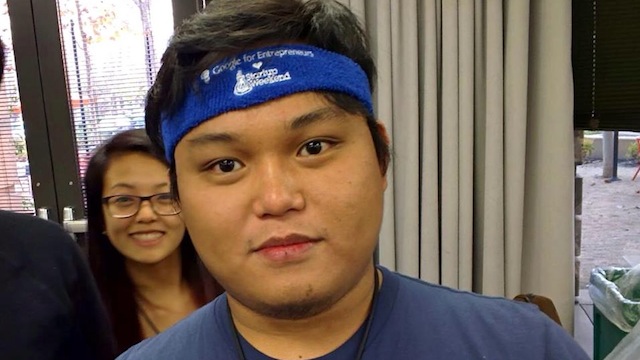SUMMARY
This is AI generated summarization, which may have errors. For context, always refer to the full article.

MANILA, Philippines – After graduating from Philippine Science High School, Francis Plaza enrolled into the Massachusetts Institute of Technology (MIT) at just 16, a full 2 to 3 years younger than most of his freshmen counterparts.
And now, at the ripe age of 20, the Philippine born developer has co-founded Muber for which he serves as the Chief Technology Officer or CTO. He described Muber as “an online marketplace that connects buyers of unique and hard-to-find items to travelers who can buy and deliver it for you.”
Plaza continued, “So whether it’s chocolate from Belgium, anime manga from Japan, or a book you want to read in your own native language, Muber lets users get the item you want while travelers earn extra income enough to cover up hotel fees, taxi cabs or other expenses.”
This is arranged through their web portal through which “users either post a request of their item or share travel details for other people to see.” Though this whole concept appeals to any person in want of a hard to find item, it traces its roots to the distinctly Filipino practice of using traveling friends or family to send and receive items from abroad.
Bootstrapping
Muber actually began as Plaza’s senior project at MIT. “It was called Project Balik Bayan back then,” Plaza said. The project was inspired by Plaza’s travels around the world with friend and co-founder, Leo Lofranco.
“I had a great mentor, Thomas Hardjono, who challenged me to pursue this project beyond the grades and the paper. Leo Lofranco was at Harvard at that time so we ended up working on the project together everyday after class.”
After graduating from MIT, Plaza and his team worked on Muber for some time at the coworking space, 47 East in Quezon City. While in the Philippines, Leo’s brother, Life, joined the co-founding team. Then they all returned to the United States, filing for incorporation in Delaware.
Unlike other entrepreneurs, who work on their startups full time, Plaza actually has a day-job for the time being. He works as a software engineer at Oracle Corporation. And though some might find this counter-intuitive to the life of an entrepreneur, Plaza finds it fitting.
“I actually work as a software engineer at Oracle as my day’s job, in part to help bootstrap my business,” he said. “My apartment along 12th Street in Midtown Atlanta also serves as Muber HQ. We’ve retro-fitted the place to be conducive for working and also sleeping after a long day’s work. So we practically can survive the day without going outside.”
Though he is essentially working two full-time jobs at this point, it is his ultimate vision for Muber that strengthens his determination. “Our goal is to build a trusted community of both item-lookers and travelers,” Plaza said. “Ideally that means that verified users can post a product and there’s a decent chance one can have his request fulfilled.”
This goal is not outside the realm of possibility, given the amount of traffic going into and out of the country. Plaza noted, “With the thousands of Filipinos flying to and from the Philippines every day, we want Filipinos to easily connect with one another and ask to ‘padala’ items for them as they travel. Muber wants to be the tool that makes sending packages easier, faster, and more economical.”

Legal challenges
The progress of some startups, most notably Uber and Tripid, have been stalled by laws and regulations that struggle to make sense of their business models. Muber, which involves the transport of goods – some expensive – across international lines, wants to avoid the same fate.
Plaza hopes that the government will not interfere with Muber, given that its users function, more or less, as informal couriers. “As with most collaborative consumption startups, the legal issues are one of the most complex. We envision that the primary use case of our service would be in the manner of requesting that we do between our traveling friends and family, albeit informally.”
Nonetheless, Plaza is well aware of the challenges that await them on sometimes even a case-by-case basis. “We are aware that there will be use cases that won’t necessarily be agreeable to our law enforcement friends, especially when it comes to customs and tax regulations,” he said. “Right now, we will work hard to ensure that all transactions within our platform will be legal and conforms to customs and duties regulations in every country we do our transactions.
In the long run, Plaza hopes that the government will change its laws with time, if only to encourage innovation rather than stifle it. “We believe, however, that laws need to evolve and we are willing to work with local and federal governments to come up with legislations necessary to adapt the changing needs of the modern world.”
The value of execution
In giving advice to future would-be entrepreneurs, Plaza is quick to refer back to the people who have influenced and mentored him, which are many. He said, “Perhaps the biggest advice that we ourselves strive to achieve actually came from our meeting with Joe Gebbia, one of Airbnb’s cofounder. He told told us that it is more powerful to have 100 users who love you than 1 million who kind of like you.”
To Plaza, this is more than just lip-service – he interprets it as it is meant to be taken: literally. Plaza continued, “Basically what he meant at least from how we understood it that we need to become literally best friends with the first 100 users we get. Email, text or whatever way of communication, get connected with your users and listen closely to their feedbacks regarding their experience using the site.”
Such feedback will help you as you build the best product you possibly can. “Their feedback will be a valuable resource to put you in the right direction in developing your product,” he said. And that’s what Plaza things all start-ups come down to: execution.
“There’s a lot of ideas out there,” he said. “I think the thing that matters most is execution. That’s what sets an idea apart from the rest. I think the best aspect of doing a business comes from the satisfaction of knowing that I am making my part, an impact to the community around me.”
Plaza continued, “Well, entrepreneurship is not necessarily for everyone. But if you decide to take that route, don’t build products because you think people will use it. Build it because you love using it; chances are people will love using it, too.” – Rappler.com
Rappler business columnist Ezra Ferraz graduated from UC Berkeley and the University of Southern California, where he taught writing for 3 years. He now consults full-time for educational companies in the United States. He brings you Philippine business leaders, their insights, and their secrets via Executive Edge. Follow him on Twitter: @EzraFerraz
Read previous articles:
Creating a taco haven in the middle of Manila
Add a comment
How does this make you feel?
There are no comments yet. Add your comment to start the conversation.